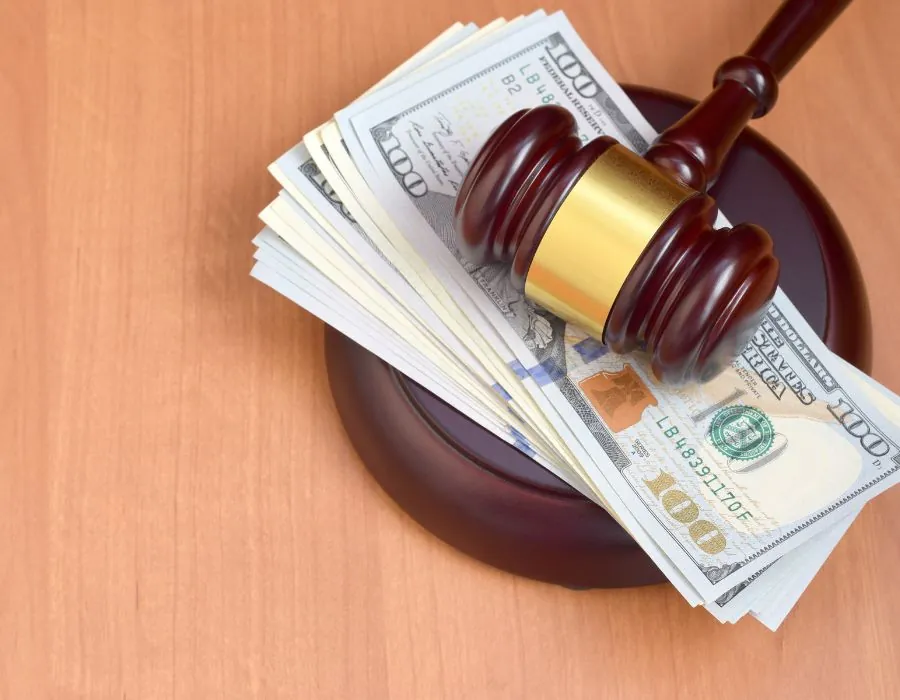Each case is unique, so it’s hard to know exactly what your case is worth before starting the claim process. However, when you call Gordon McKernan Injury Attorneys after your accident, you’ll speak to an experienced personal injury lawyer in Louisiana who can give you a rough idea of what to expect.
What is the Process of Personal Injury Settlements?

When it comes to personal injury settlements, the process can vary based on the details of the case. Typically, the negotiation process begins with the injured party and their attorney submitting a demand letter to the at-fault party’s insurance company. This letter outlines the injuries sustained, the medical treatment received, and the amount of compensation being sought.
From there, the insurance company will respond with a settlement offer, and negotiations will ensue. Factors that contribute to the amount of the settlement include the severity of the injuries, the extent of the medical treatment required, the impact on the individual’s life, and the degree of fault on the part of each party.
In some cases, negotiations may not lead to a satisfactory settlement, and the case may proceed to trial. However, the majority of personal injury cases are resolved through settlements, as they can be less time-consuming and costly than going to trial.
Personal Injury Lawsuit Outcomes
Personal injury lawsuit outcomes can be influenced by many factors, ultimately determining the worth of a case. The type of personal injury case, such as car accidents, slip and fall, or medical malpractice, can greatly impact the potential compensation. Success rates at trial are also significant, as some cases are more likely to result in a favorable verdict than others.
Additionally, it’s important to consider any settlement offers that may be presented, as accepting a settlement can result in a quicker resolution and guaranteed compensation rather than risking a trial outcome.
Serious injuries can greatly impact the amount of compensation awarded in a personal injury case. Severe injuries often result in higher settlements or trial verdicts due to the long-term impact on the individual’s health and ability to work. The defendant’s insurance policy also plays a crucial role, as there may be limits to the amount that can be awarded in a lawsuit based on the policy’s coverage.
Hiring a lawyer or filing a lawsuit can also significantly impact the outcome of a personal injury case. A lawyer can navigate the legal process, negotiate with insurance companies, and represent the individual’s best interests in court.
Common Compensation in Personal Injury Cases
In personal injury cases, there are several common types of compensable losses that the injured party can seek compensation for. These may include medical bills, both current and anticipated future medical expenses, as well as any time missed at work due to the injury. Additionally, pain and suffering, emotional distress, and loss of enjoyment of life can also be included in the compensable losses.
Damages in personal injury cases are typically compensatory, meaning they are intended to compensate the injured party for their losses. This can include:
- Economic damages, such as medical expenses and lost wages, as well as
- Non-economic damages, such as pain and suffering.
- In rare cases, punitive damages may also be awarded to punish the defendant’s wrongdoing and deter similar behavior in the future.
Several factors can increase personal injury damages and boost the overall value of a case. These factors may include the severity of the injuries, the level of negligence or misconduct on the part of the defendant, and the impact of the injury on the plaintiff’s life.
Additionally, the expertise of the personal injury attorney and the strength of the evidence presented can also play a significant role in determining the value of a case.
Factors Influencing Personal Injury Case Outcomes
When it comes to personal injury cases, several factors can significantly influence the outcome. One of the most important factors is the percentage of fault. In many states, including Louisiana, the compensation for a personal injury claim is directly impacted by the percentage of fault assigned to each party involved. This means that if the injured party is found to be partially at fault for the accident, their compensation may be reduced accordingly.
Another important factor is the obligation to mitigate damages. In personal injury cases, the injured party has a legal obligation to take reasonable steps to minimize the impact of their injuries. Failure to do so can also affect the compensation they receive.
Furthermore, prior settlements and verdicts in the jurisdiction can also play a role in determining the outcome of a personal injury case. Insurance companies often take into account the outcomes of similar cases when assessing the value of a claim.
When it comes to calculating settlement compensation payouts, insurance companies often use computer programs like Colossus. However, these programs have limitations, especially when it comes to assessing pain and suffering, which can greatly impact the value of a personal injury claim.
The Role of Legal Representation in Determining Settlement Amounts
When it comes to personal injury cases, determining the worth of your claim can be a complex and overwhelming process. Many factors come into play, such as the severity of your injuries, the impact on your daily life, and the negligence of the other party involved.
This is where legal representation plays a crucial role in helping you receive the settlement amount you deserve. Personal injury lawyers can navigate the legal process, negotiate with insurance companies, and gather evidence to build a strong case on your behalf.
Advocating for Your Rights in Personal Injury Cases
When facing a personal injury case, it’s crucial to have a knowledgeable and experienced personal injury lawyer on your side. They play a vital role in ensuring that your rights are protected and that you receive the compensation you deserve.
A personal injury lawyer can assist in gathering crucial evidence to support your case, including witness statements, expert testimonies, and medical records. They will also calculate your losses, such as medical expenses, lost wages, and pain and suffering, to build a strong case for fair compensation.
In addition, a personal injury lawyer will have the skills to file a lawsuit on your behalf if negotiations with the insurance company fail to reach a satisfactory settlement. Their understanding of the legal process and their ability to navigate the complexities of personal injury law can greatly impact the outcome of your case.
Settlement Offer Negotiating
By negotiating, there is a potential for a higher settlement amount, which can help cover medical expenses, lost wages, and other damages resulting from the injury.
One important step in the negotiation process is to submit a demand letter outlining the injuries and damages to the at-fault party’s insurance company. This letter serves as a formal request for compensation and provides an opportunity to present the full extent of the victim’s losses. It’s important to accurately document and calculate all damages, including medical bills, rehabilitation costs, and pain and suffering.
Compensatory damages play a crucial role in a settlement agreement, as they aim to compensate the victim for their losses. These damages may include both economic and non-economic losses, such as medical expenses, lost wages, and emotional distress. Negotiating a fair amount for compensatory damages is essential in reaching a satisfactory settlement offer.
Additionally, it’s important to note that by accepting a settlement, the victim typically agrees to release the wrongdoer from any future legal action related to the injury. This is why engaging in negotiation and striving for a fair settlement offer is essential.
Filing a Personal Injury Lawsuit or Warning of One
By filing a lawsuit, the injured party can seek compensation for medical expenses, lost wages, pain and suffering, and other damages. Additionally, a lawsuit can also serve as a warning to the responsible party, encouraging them to settle the case outside of court and potentially leading to a higher settlement payout.
Legal action may be necessary in cases where the responsible party denies liability, fails to offer a fair settlement, or if the injuries are severe and require ongoing medical treatment. Taking legal action can also have a significant impact on the case, as it may prompt the responsible party to take the matter more seriously and increase the likelihood of a higher settlement payout.
Personal Injury Claims and Settlements Timeline
Understanding the timeline for personal injury claims and settlements can help you navigate the legal process and ensure you receive fair compensation for your injuries. From the initial filing of the claim to the final settlement negotiations, it’s essential to know what to expect and how to protect your rights throughout the process.
Payment Procedures for Personal Injury Settlements
Receiving payment for personal injury settlements involves several important procedures.
Once a settlement agreement has been reached, the next step is the release of liability, which will legally absolve the at-fault party from further claims related to the incident. Payment methods for settlements can vary, with options such as lump-sum payments, structured settlements, or annuities, depending on the circumstances of the case.
Before the injured party receives their portion of the settlement, legal fees and any outstanding medical liens or other debts related to the injury must be deducted from the total amount. Legal fees are typically paid directly to the attorney, while medical liens and other debts are satisfied before funds are distributed to the injured party.
The distribution of funds will then occur, with the remaining amount going to the injured party. It’s important to note that any applicable taxes and fees on the settlement amount should also be considered.
Frequently Asked Questions (FAQs)
What Types of Personal Injury Cases Have the Highest Compensation?
- Personal injury cases that result in the highest compensation often involve fatalities, severe injuries requiring extensive treatment, permanent disabilities, and a diminished quality of life.
How Can You Determine a Fair Personal Injury Settlement Amount?
- Determining a fair personal injury settlement amount involves considering various factors that contribute to the overall impact of the injuries sustained. The components of economic damages, pain and suffering, and punitive damages play a crucial role in calculating the appropriate compensation in a personal injury case.
How Gordon McKernan Injury Attorneys Can Help You

At Gordon McKernan Injury Attorneys, our personal injury lawyers have experience in handling cases like yours, and our team is dedicated to negotiating with insurance companies on your behalf to ensure that you receive fair compensation for your injuries. If a fair settlement can’t be reached, we’re prepared to take your case to trial to fight for the compensation you deserve.
Whether you have been injured in a car accident, slip and fall, or any other type of personal injury incident, our Baton Rouge personal injury lawyers have the skills to handle your case with care and compassion. Give us a call today to see for yourself. We offer free consultations and don’t get paid unless you do.
It’s time to Get Gordon and Get it Done!
INJURED?
GET HELP NOW!

